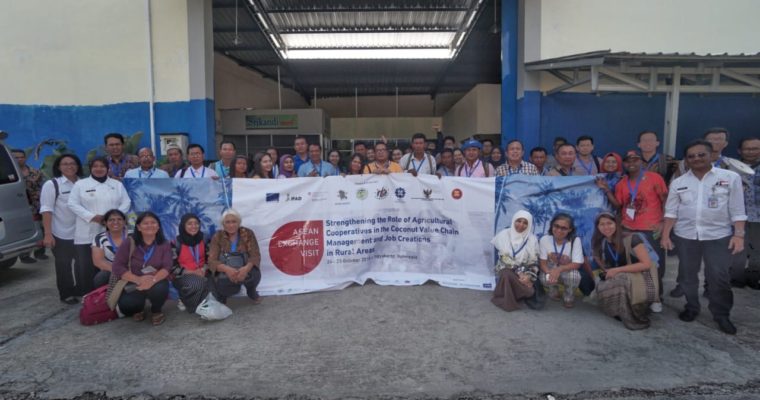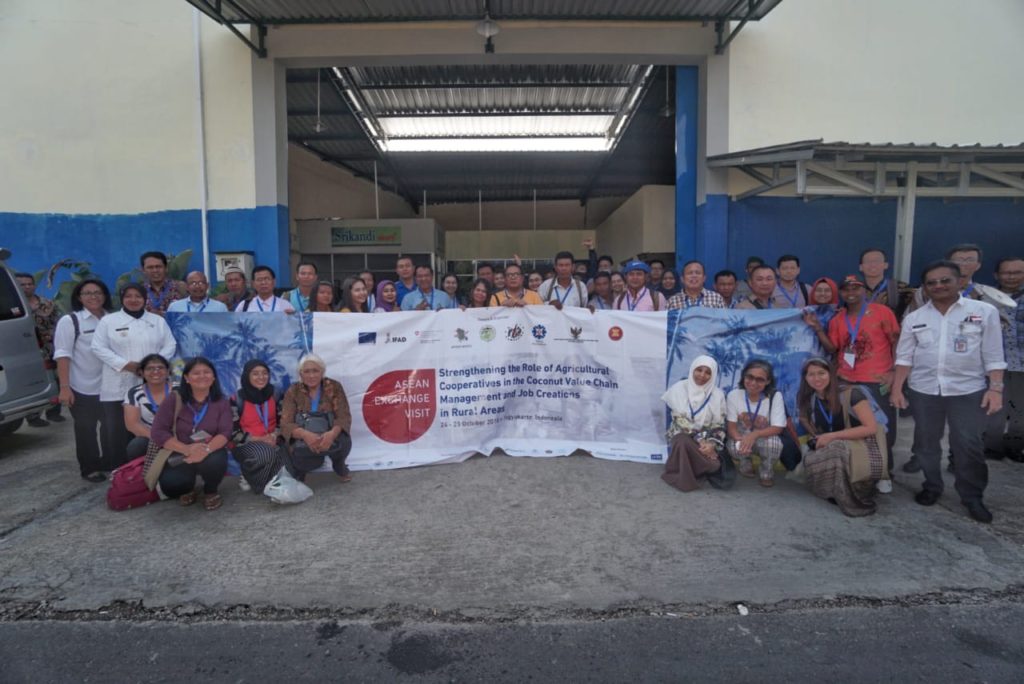Coconut farmers, farmer organizations, government representatives, cooperatives, and entrepreneurs from Indonesia gathered in Indonesia on 24-25 October 2018 for the two-day learning exchange on coconut value chain.
For this ASEAN Exchange Visit themed “Strengthening the Role of Agricultural Cooperatives in the Coconut Value Chain Management and Job Creations in Rural Areas”, the delegates visited Purworejo in Central Java and Nglanggeran Village in Yogyakarta, Indonesia.
Learning Visit in Purworejo
Upon arriving in Purworejo, the delegates of the ASEAN Learning Series were warmly received by the government leaders of the city.
Government officials from Thailand and the Philippines shared about the current situation, challenges, and opportunities in coconut value industry in their respective countries.
Meanwhile, Susiati Dewi of Bank Indonesia discussed about Digital Solutions for Agricultural Cooperatives in Indonesia to increase productivity and efficiency.
MTCP2 National Implementing Agencies from the Pacific/PIFON also shared about their programs, initiatives and activities on coconuts, the region having a big coconut industry. Jack Chottu from Solomon Islands, owner of Chottu’s Coconut Products, shared his company’s products and their products and the production process.
University of Gadjah Mada in Yogyakarta chemistry lecturer Dr. Ani Setyopratiwi discussed about the various factors determining the quality of coconut oil. After which, the participants tried virgin coconut oil (VCO) from different countries to compare the taste, smell, etc.
In the afternoon, the delegates went to Koperasi Wanita Srikandi for another learning session. The cooperative produces coco sugar, VCO, coco soap, etc.
Learning Visit to Nglanggeran
The next day, the delegates traveled to Nglanggeran, a village with rich in forestry, agriculture, geology and tradition, to resume the learning session on the following subjects:
- Victoria br. Simanungkalit, Act. Secretary to the Deputy Minister for Production and Marketing, discussed about the Indonesian efforts in the development of agricultural cooperatives in the country.
- Shahmizan Sharuddin, General Manager of Area Farmers’ Organization Bagan Datoh, Perak Region, Malaysia discussed about linking coconut production to rural empowerment in Malaysia.
- The International Coconut Community discussed about the world market trend on coconut production, processing, and marketing.
- Impack Pratama discussed about their Solar Dryer Dome and how it improves drying process of various produce.
- Nuning Barwa of Martha Tilaar Group shared about community development and their women empowerment inclusive business model.
- Rifki Weno of Indonesian company Tokopedia shared about their company’s plight in e-commerce.
- PRISMA shared about their experience working in the coconut sector of Indonesia.
- SAFIRA shared about their experiences in their value chain financing case study in Indonesia.
Lunch was catered by Slow Food Yogyakarta. Slow Food movement promotes organic and sustainable food consumption. They served locally source and produced food, desserts garnished with coconuts, and coconut juice served in containers made from coconut shell.
After listening to presentations and engaging in discussions, the participants went for a quick visit to the water reservoir built in the village to be a source of water for their plants during the drought season.
The last stop for this learning visit was Griya Cokelat, where the participants get to taste their chocolate products.
Destry Anna Sari of ASEAN Center for the Development of Agricultural Cooperatives (ACEDAC) gave the closing remarks before the delegates went back to Malioboro, Yogyakarta.
The ASEAN Learning Exchange is organized by the ASEAN Foundation in cooperation with the consortium Asian Farmers Association (AFA) and La Via Campesina (LVC) and is supported by the European Union and the International Fund for Agricultural Development through the ASEAN Farmer Organization Support Program (AFOSP)-Medium Term Cooperation Program Phase 2 (MTCP2).
PHOTOS
- ASEAN Exchange Visit Days 1 & 2
- ASEAN Exchange Visit 2018 – Day 1 (ASEAN Foundation)
- ASEAN Exchange Visit 2018 – Day 2 (ASEAN Foundation)
VIDEOS
RELATED NEWS
- ASEAN representatives exchange experience, knowledge on coconut value chain (ASEAN)
- Pohon seribu guna, bantu basmi kemiskinan (Astro Awani)
- Puluhan Delegasi ASEAN Kumpul di Purworejo Belajar Pengolahan Kelapa (Detik News)
- Produk Kelapa Purworejo Diakui Dunia (Radar Jogja)
- Delegasi ASEAN Kunjungi Koperasi Wanita Srikandi (Koranjuri)
- Petani Kelapa ASEAN – Pasifik Studi Banding ke Purworejo (KR Jogja)
- Produk Kelapa Asal Purworejo Mulai Dilirik Dunia (Good News from Indonesia)
About AFOSP-MTCP2
AFOSP-MTCP2 is a capacity building program funded by the European Union with co-financing from the International Fund for Agricultural Development (IFAD) and the Swiss Agency for Development and Cooperation. The program is being implemented in seven ASEAN countries through the consortium Asian Farmers’ Association for Sustainable Rural Development (AFA) and La Via Campesina (LVC). AFOSP-MTCP2 supports the strengthening of national farmers’ organizations (FOs) and their national platform towards improving their institutional capacity to deliver economic services to their members as well as to effectively engage them in policy processes. At the ASEAN level, the consortium AFA – LVC works in partnership with the ASEAN Foundation in expanding the spaces for the engagement of FOs in ASEAN processes.





Comments are closed